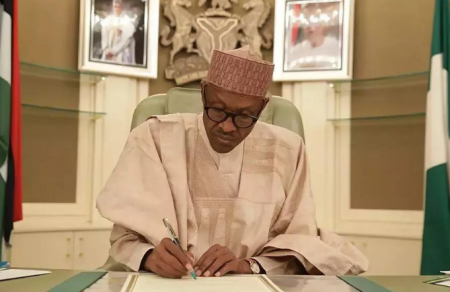P
PressRoom
Guest
President Buhari on Tuesday signed the instrument of ratification of the treaty on the establishment of the Abidjan-Lagos corridor among the Governments of Republic of Benin, Cote D'ivoire, Ghana, Togo and Nigeria.
But the establishment on Abidjan-Lagos corridor was okayed in 2014, a report by Daily Trust confirms so. It was ratified by the then Federal Government led by Goodluck Jonathan.
The then Works Minister, Mike Onolememen disclosed that the objective of the Abidjan-Lagos Trade and Transport Facilitation Project (ALTTFP) is to reduce trade and transport barriers in the ports and on the roads along the Abidjan-Lagos corridor in Ghana, Togo, and Benin.
According to him, the objective of the treaty is to facilitate safe and efficient movement of persons and goods, regional and international trade and transport by improving on the road infrastructure as well as simplifying and harmonizing the requirements and controls governing movement of goods and persons “with a view to reducing transportation costs and transit times”.
In a world bank report, the project was approved (as of board presentation) on March 23, 2010, and a closing date of June 30, 2017.
The Sectors that the project will touch on include:
1. The first component being Trade facilitation. This component will include the following sub-components:
2. The second component is the improvement of the road corridor's infrastructure.
3. The third component is the project management and coordination. This component will include provision of technical advisory services and logistical support (including office equipment, materials, supplies, and vehicles) required to sustain management and coordination of project implementation activities including monitoring and evaluation of progress achieved in the execution of the project.
4. Finally, the fourth component is the HIV/AIDS programs and corridor performance monitoring
But the establishment on Abidjan-Lagos corridor was okayed in 2014, a report by Daily Trust confirms so. It was ratified by the then Federal Government led by Goodluck Jonathan.
The then Works Minister, Mike Onolememen disclosed that the objective of the Abidjan-Lagos Trade and Transport Facilitation Project (ALTTFP) is to reduce trade and transport barriers in the ports and on the roads along the Abidjan-Lagos corridor in Ghana, Togo, and Benin.
According to him, the objective of the treaty is to facilitate safe and efficient movement of persons and goods, regional and international trade and transport by improving on the road infrastructure as well as simplifying and harmonizing the requirements and controls governing movement of goods and persons “with a view to reducing transportation costs and transit times”.
In a world bank report, the project was approved (as of board presentation) on March 23, 2010, and a closing date of June 30, 2017.
The Sectors that the project will touch on include:
- Rural and Inter-Urban Roads and Highways - 80%
- Other domestic and international trade – 15%
- Health – 3%
- Public Administration - Transportation – 2%
1. The first component being Trade facilitation. This component will include the following sub-components:
- facilitation of collection and sharing of relevant information and data among customs agencies along the corridor;
- establishment of an adequate internal reporting system aimed at improving management control of customs agencies' operations;
- and strengthening of the operational capacity of the recipients' national road transport and transit facilitation committees.
2. The second component is the improvement of the road corridor's infrastructure.
3. The third component is the project management and coordination. This component will include provision of technical advisory services and logistical support (including office equipment, materials, supplies, and vehicles) required to sustain management and coordination of project implementation activities including monitoring and evaluation of progress achieved in the execution of the project.
4. Finally, the fourth component is the HIV/AIDS programs and corridor performance monitoring


